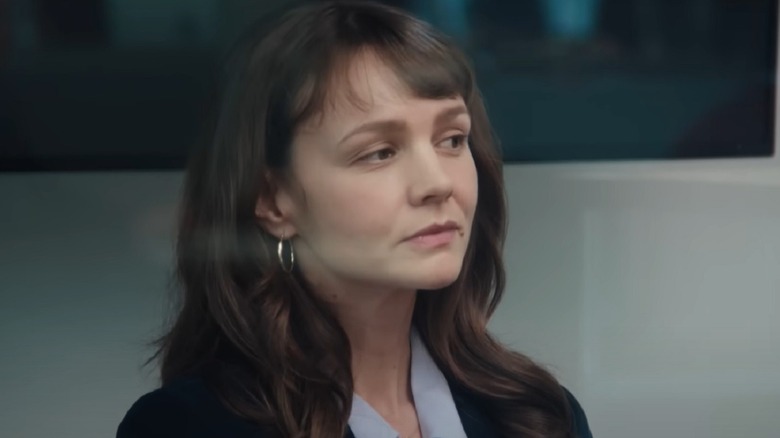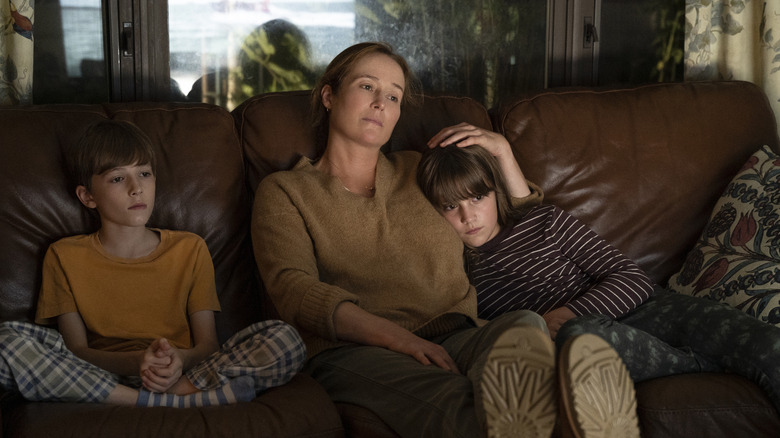She Said Review: Full Of Righteous Fury
- Powerful performances
- Moving portraits of women
- Brief overly self-aware moments
"She Said" couldn't have come at a better time. In the aftermath of highly publicized trials designed to limit assault victims' abilities to publicly name their abusers, and Supreme Court decisions that effectively strip away long-held human rights from women, the #MeToo movement that felt like a reckoning just a few short years ago is being systematically dismantled. But with powerful performances from its lead and supporting cast, and a bloody-minded determination to refuse to allow the issue of sexual violence against women to be swept under the rug ever again, "She Said," which screened at the 2022 New York Film Festival, recaptures the moment and dares audiences to look away.
"She Said" begins with Megan Twohey (Carey Mulligan) of the New York Times working on a story to expose then-presidential candidate Donald Trump for sexual assault. Despite her efforts, he is elected president — but there's a glimmer of hope for justice when Bill O'Reilly is fired from Fox News after a piece was written about the settlements for his many accusations of sexual misconduct in the workplace. While Twohey is on maternity leave, fellow reporter Jodi Kantor (Zoe Kazan) picks up the thread, casting a critical eye on sexual violence in Hollywood. It doesn't take her long before she begins to hear stories, all disturbingly similar, about Miramax founder and Hollywood titan Harvey Weinstein, regarding his conduct towards women.
The only problem? No one is willing to go on the record with their experiences; they're either terrified of professional retribution from the incredibly powerful and vindictive Weinstein, or are legally blocked from speaking out because of non-disclosure agreements signed in exchange for financial settlements. The entire system works exactly as designed, protecting men of influence from facing any real consequences for their actions. It's only with an overwhelming mass of evidence and a few brave women willing to risk their safety and their reputations in order to hold him accountable that the wheels of justice start to turn.
The significance of the story
There's a devastating quality to "She Said" that speaks to the injustice of what the women in the film have experienced. When we meet the former assistants at Miramax, how many of them are still working in the industry that they once hoped to make a career in? They've all been pushed out, forced to abandon dreams that filled their youthful fantasies, all because there are powerful men who think they are owed women's bodies. This specific point isn't belabored in the film, but the loss of all that potential, not only for the women themselves but for all of us who will likely never get to see what they could have created, is visceral.
There are moments of "She Said" that verge on being too on-the-nose, usually when Megan and Jodi are discussing the importance of the story they're working on. This is a fault of the script more than the actors — the passion of Mulligan and Kazan comes through, how much they believe in the significance of this story — but it's almost as though the writing doesn't trust the audience to know how much it matters without being explicitly told. "She Said" is at its weakest during the first act, when it has to dance around real-life celebrities who are connected to the Weinstein scandal but don't actually have an on-screen presence in the film.
A Unique Approach to Violence
It picks up, however, when it is able to focus on Miramax employees who aren't immediately recognizable, giving tremendous actors like Samantha Morton and Jennifer Ehle the opportunity to lay themselves bare without the pressure of doing an impersonation of a famous film star. These sequences are the lifeblood of "She Said," and what's incredible is that director Maria Schrader never shows a single frame of sexual assault. Their mere words, combined with images of empty rooms, and clothes strewn about on the floor, sometimes featuring accompanying audio, fully capture the horror of the situation without needing to actually show a thing.
This approach — which flies in the face of so many other films about sexual violence, which often feel the need to be as explicit as possible in order to shock the audience into understanding how serious it is — proves the value of Schrader's instincts. It's almost more powerful to rely entirely on the characters' telling of their own stories. Rather than imposing on them a dramatization of their trauma, they are given the opportunity to reclaim their voices. At every turn, "She Said" rejects the temptation to sensationalize the story, instead choosing to keep it intimate and grounded in reality. The decision to feature Ashley Judd in the film playing herself as she makes the decision of how to interact with the investigation is another powerful reclamation of agency.
"She Said" has a few stylistic missteps, but they're easy to forgive as the narrative reaches a roaring crescendo that sees it come toe to toe against the best that the journalistic drama genre has to offer. Mulligan and Kazan center the story with utter conviction that borders on fury, while Samantha Morton and Jennifer Ehle take their brief screen time and absolutely run away with the entire film. And as straightforward and unaffected as "She Said" is, it never fails to produce a strong emotional impact that builds over the course of the film into an irrepressible righteous fury.


